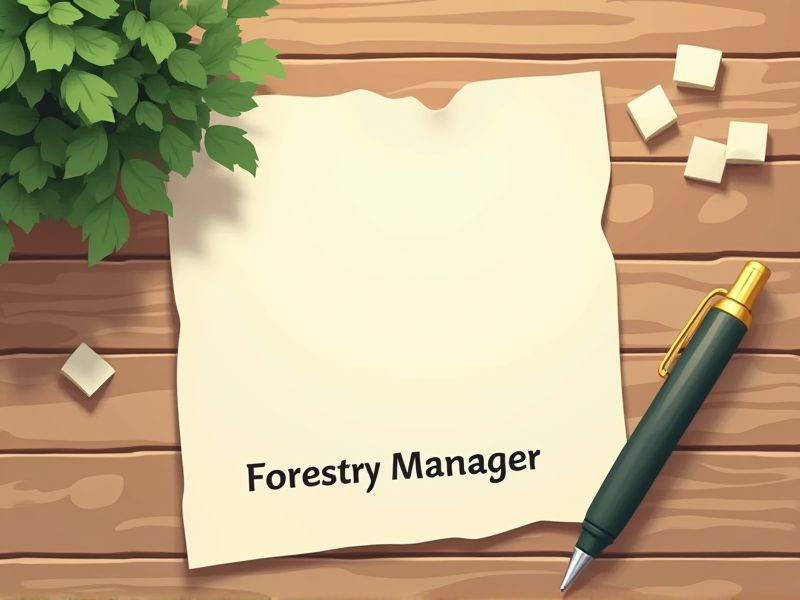
Forestry Managers must possess certain certifications to ensure sustainable management of forest resources, which directly influences ecosystem health and biodiversity. These certifications affirm a manager's understanding of environmental laws, enabling effective compliance and forest conservation. With proven expertise in resource management and fire control, certified professionals are better equipped to mitigate natural disaster risks. Some important certifications you may need as a Forestry Manager include these.
Certified Forester (CF)
Certified Foresters possess specialized knowledge and skills that enhance the management and conservation of forest resources. Their expertise in sustainable forestry practices ensures adherence to environmental regulations, reducing the risk of legal penalties. With certification, foresters demonstrate up-to-date proficiency in industry standards, promoting effective forest health and productivity. The CF designation can bolster a forestry manager's credibility, fostering trust among stakeholders and facilitating successful project outcomes.
Registered Forester (RF)
A Registered Forester (RF) is essential for a Forestry Manager because they possess the required expertise in sustainable forest management practices. Their knowledge in forest economics aids in optimizing resource allocation and enhancing financial returns. They have the ability to ensure compliance with environmental regulations, reducing legal risks. Their skills in ecological assessment help maintain biodiversity and forest health, promoting long-term productivity.
Forest Stewardship Council (FSC) Certification
The Forest Stewardship Council (FSC) Certification ensures sustainable forest management practices, preventing deforestation and ecosystem degradation, which helps in maintaining biodiversity. Obtaining FSC certification enables forestry managers to access global markets that demand environmentally responsible products, which can lead to increased financial returns. It aids in building consumer trust and enhances brand reputation as consumers increasingly prefer products sourced from sustainably managed forests. Compliance with FSC standards helps forestry managers meet regulatory requirements and mitigate legal risks associated with unsustainable forestry practices.
Sustainable Forestry Initiative (SFI) Certification
SFI Certification ensures forestry managers adhere to sustainable practices, promoting ecological balance and biodiversity conservation. The certification improves market access, as many consumers and businesses prefer products sourced from responsibly managed forests. Through SFI guidelines, forestry managers increase operational efficiency, reducing waste and enhancing resource management. SFI Certification fosters public trust, showing a commitment to sustainable development and environmental stewardship.
Certified Professional in Forestry Operations
Forestry Managers face complex ecosystems management that requires specialized knowledge to maintain biodiversity and sustain forest resources. A Certified Professional in Forestry Operations ensures the application of best practices and adherence to regulatory standards, mitigating environmental impact. Certification provides validation of skills in advanced forestry techniques, enhancing efficiency and productivity in forest management. It fosters trust among stakeholders by demonstrating a commitment to sustainable and responsible forestry practices.
International Society of Arboriculture (ISA) Certified Arborist
The ISA Certified Arborist designation provides forestry managers with a standardized understanding of tree biology and care, resulting in more informed decision-making in forest management. Forest health assessments require accurate identification of potential threats, something an ISA Certified Arborist is specifically trained to do. Proper tree care practices can significantly extend the lifespan of valuable forestry resources, which an ISA certification ensures. Without such certified expertise, forestry managers could miss crucial diagnosis of diseases or pests, leading to potential degradation of forest environments.
Certified Wilderness Biologist (CWB)
Forestry managers rely on Certified Wilderness Biologists to assess the ecological impact of forestry activities and ensure sustainable development. CWBs provide expert knowledge on wildlife habitats, helping to reduce adverse effects on biodiversity during logging operations. Their expertise in ecosystem dynamics supports forestry managers in developing conservation strategies that align with regulatory requirements. By collaborating with CWBs, forestry managers optimize land use while protecting natural resources and maintaining ecosystem balance.
Occupational Safety and Health Administration (OSHA) Certification
OSHA certification equips forestry managers with essential knowledge of workplace safety standards, reducing accident rates in forest operations. Understanding OSHA regulations helps in creating comprehensive safety protocols, which protect workers and reduce liability for companies. Certification ensures compliance with federal guidelines, thereby preventing potential fines and legal complications. With proper safety certifications, forestry managers can foster a culture of safety, increasing overall productivity and worker morale.
ISO 14001 Environmental Management Systems Certification
Obtaining ISO 14001 certification often leads forestry managers to implement systematic approaches for identifying and mitigating environmental impacts. This certification frequently enhances regulatory compliance, reducing the risk of penalties associated with non-compliance. The structured framework it provides typically results in improved operational efficiency, often leading to cost savings through resource conservation. Having this certification usually bolsters stakeholder trust and reputation, potentially leading to expanded market opportunities.
Geographic Information Systems (GIS) Certification
Obtaining a GIS Certification equips a forestry manager with the skills to analyze spatial data, improving decision-making regarding forest health and land use. Enhanced mapping capabilities allow managers to efficiently monitor and manage forest resources, reducing the risk of ecological imbalances and promoting sustainability. By understanding and predicting environmental patterns, GIS-certified forestry managers can better plan for natural disturbances like fires or pest outbreaks. With these competencies, they can effectively communicate data-driven insights to stakeholders, facilitating informed policy and conservation efforts.
Summary
When you attain certifications as a Forestry Manager, your professional credibility and marketability significantly increase. These qualifications lead to better job opportunities and potential for higher earnings. Certification equips you with contemporary skills and knowledge, enhancing decision-making in sustainable forest management. This recognized expertise may result in improved trust with stakeholders and community partners, bolstering project outcomes.
